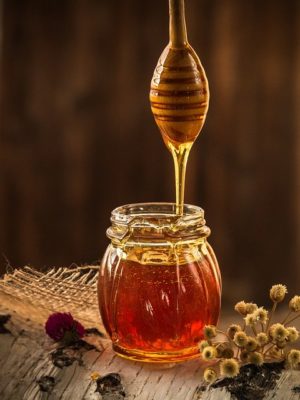 Dogs and Honey: A Sweet Relationship? Dogs are often called our ‘best friends’ and ‘canine companions.’ At the very least, we love their loyalty, character, and intelligence. Some take it a step further and are trained as service dogs for the disabled!
Dogs and Honey: A Sweet Relationship? Dogs are often called our ‘best friends’ and ‘canine companions.’ At the very least, we love their loyalty, character, and intelligence. Some take it a step further and are trained as service dogs for the disabled!
Whether it’s after helping a human friend in need, or after a gravity-defying catch during playtime, good pooches get tasty treats! Some dogs even get rewarded with a little honey. But is that a good idea? Dogs may be sweet on the inside, but can their insides have any sweets?
The Magic of Honey
From production to consumption, honey is wonderful! Yet, it is made in a way that is not for the faint of heart (or stomach). It starts as a sweet liquid produced by flowers called nectar. Bees consume the nectar, then regurgitate it in the hive as stored food for other bees. Over time, the thrown-up nectar is eaten, digested, and thrown up over, and over again. That bee vomit transforms into that tasty golden goodness we know as honey.
The creation of honey may sound unappetizing. The nutritional benefits are much sweeter! First, the appealing flavor comes from a mix of natural sugars. It is, then, no surprise that honey will increase blood sugar levels. Yet, honey’s sugar content is less than that of refined table sugar. This means that it can be used as a healthier alternative to your daily sweetener.
Raw (unpasteurized) honey is, surprisingly, packed with antioxidants, including phenolic acids and flavonoids. These antioxidants can help lower blood pressure. Lower blood pressure helps reduce the risk of heart attacks and strokes. That’s a benefit table-sugar can’t offer! Plus, honey contains anti-bacterial and anti-inflammatory compounds. This makes honey an effective treatment for cuts and burns.
The Doggy Diet
Our furry friends are basically distant, domesticated relatives of wolves. Wolves are more fearsome than their tamed cousins. Yet, they are very similar beneath the surface. For example, dogs and wolves are carnivores. This means that meat is the centerpiece of their dinners.
However, wolves will eat berries and fruits to supplement their meaty meals or to get by in times of need. Yet, their systems are not meant to handle too much plant material. This shows that sweetness must be recognized by a wolves’ taste buds. The same goes for domestic dogs.
This can explain why dogs get a taste for sweeter foods like fruits and peanut butter. However, some sugary foods, like chocolate, are dangerous for dogs to consume.
Is Honey Safe for Dogs?
We know honey is a healthier sweetener for humans; we know that dogs will eat some sweet foods. So, is honey a safe treat for our loyal canine companions? Yes, dogs can enjoy honey just like their human counterparts. In fact, dogs can also feel its soothing, anti-inflammatory properties. If your pup appears to be dealing with a sore throat, give him a little honey. A little spoonful can go a long way!
Raw honey also contains small amounts of flower pollen local to the hives from which it came. That local pollen can combine with honey’s soothing properties to bring sweet relief to dogs with outdoor allergies.
Unfortunately, there is little scientific evidence out there supporting this claim. Yet, if it doesn’t work, a tasty pick-me-up couldn’t hurt! Especially when your faithful buddy is feeling a bit sluggish from those annoying allergies.
Conclusion
Honey can be a tasty, fat-free treat for our sweet pooches. It even comes with some surprising health benefits. However, honey’s high sugar content makes it a high-calorie food, so don’t give him too much. Especially if he is already overweight.
The sugars in honey can cause tooth and gum rot over time, so don’t feed honey to dogs with sensitive teeth and gums. Honey can also be dangerous to dogs with high blood sugar, so don’t give it to diabetic pooches. Your pup may be sweet, but play it safe and talk to your vet before giving your dog this sweet treat!
Sources
https://www.healthline.com/nutrition/10-benefits-of-honey
https://www.ncbi.nlm.nih.gov/pmc/articles/PMC5406168/
https://www.ncbi.nlm.nih.gov/pubmed/12358452
https://thehoneybeeconservancy.org/2015/04/03/honey-for-dogs/

Hi, I am Andrew. I am the editor at FamilyWithPets. I am enjoy learning and sharing information about pets that helps enrich the lives of pets and pet parents.
